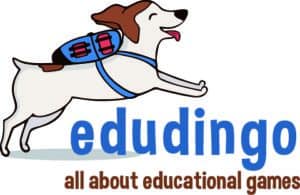I am François Guély, and I have created the Edudingo website to help parents, teachers, educators, and therapists leverage the educational potential of nonelectronic:
- Educational games (that is games that were purposefully designed for educational purposes)
- Games in general (that is using games that were not initially designed to educate for educational purposes)
By “nonelectronic game” I mean tabletop games, board games, card games, dice games, flashcard-based games, file folder games, indoor/outdoor games… basically any game that does not require the use of a computer, a tablet, or a smartphone.
Edudingo strives to help teachers, educators, and counselors:
- Understand which games are relevant for their classrooms (or students), according to their current teaching objectives, whether or not they are purely academic (Maths, ELA…) of not (SEL, behavior…)
- Know how to use them effectively. For example how to create a progression in knowledge and skills acquisition, how to set up gaming sequences, mix them with courses…
- Know which approaches have been proven to improve learning outcomes, according to the scientific literature on the use of games for learning purposes
- Quickly determine which educational games are available for a specific objective, especially in the US, with practical information about them
- Know how they can design games by themselves to fit a specific educational purpose, or build a class project to have students create a game
- Know how they can use existing noneducational games either because they have an unintended educational outcome, or because the game’s pieces & cards can be used with different rules for educational purposes
It also aims at helping parents:
- Understand which games to use at home, according to their situation and the educational objective they have (which can be very diverse: solving a specific difficulty their child has, increasing cognitive capabilities of children, reinforcing class content mastery, improving behavior and social skills)
- Know how they can use these games effectively
- Understand why teachers might use games at school, and why they might use them in very different ways from home
- Create their own games if they want to
- Understand which games might produce the best outcomes and why
- Understand the fuzzy frontier between party game, family game, educational game… and why a game can possibly be in more than one category
I will also try to find the time to be useful to therapists, which often find that games are a relevant approach for them.
Our story
This website is dedicated exclusively to educational games for English speakers, and more specifically according to the American education system (taking into account, for instance, the US common core standards rather than any other curriculum standard).
But from time to time expect me to introduce you to games or ideas coming from either the French-speaking, the German-speaking (there are lots of interesting games created in Germany), or the Japanese-speaking world (I am fluent in Japanese, both spoken and written, and I have lived several years in Japan).
I have been creating educational games since 2001, and since 2006 I have created an educational game publishing company called Aritma which currently proposes 21 educational games (two new games are added to the collection every year). They are designed for French-speaking teachers and parents and are very successful, especially in the French, Belgium, and Swiss markets.
I am also extremely involved in educational games for English-speaking teachers and parents. It is my belief that the French and English-speaking worlds have always exchanged ideas and practices in the distant and recent past, and always enriched each other in a mutually beneficial way. Another reason is that I have always (since a very young age) loved American culture, which is equally important to me as French culture (and I spend more time every day reading, watching, and speaking English than French actually).
Also expect me not to take sides in the endless and fruitless debate between game geeks, families, teachers, children, therapists, and counselors about what should be considered a “real” game or a “fun” game, or an “educational” game. I am not fond of useless controversies. To me, a game is a “real” game if it is perceived as a “real” game by its audience. And the different potential audiences for games have completely different needs and of course perceptions. “Fun”, “Educational”, and “Interesting”… these terms do not at all mean the same thing for a 4-year-old child, a passionate game geek, a mother dedicated to the progress of her children, a school teacher…
